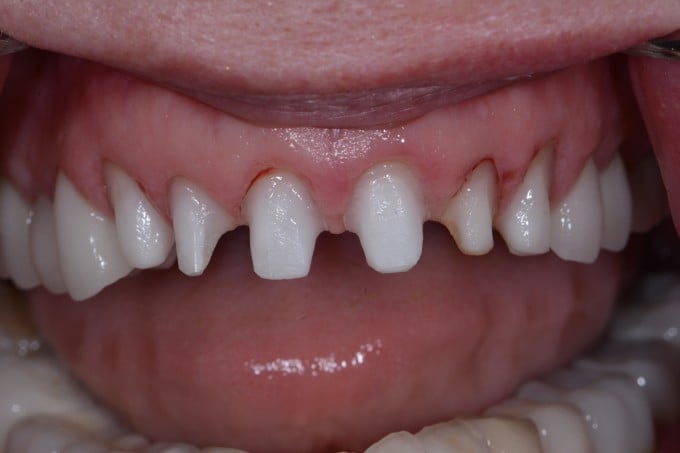DENTIST PRICES and DENTAL COSTS: Finding Affordable Dental Care
Let's start with the shocking truth: Dentist prices do not differ much. However, your dental costs will vary greatly depending on which dentist you...
6 min read
Dr. Joanne Baldos and Dr. Adam Szymczak : Dec 28, 2019 7:40:23 PM

Root canals have a bad reputation.
When a dentist says “You need a root canal”, the most common response from a patient is :(
We searched the internet to find out why people feel negative about root canals:
No matter where you live, this blog post will guide you to reduce your financial root canal costs AND eliminate your "emotional root canal costs” ( negative experiences).
There are things that you should know and do BEFORE, DURING, and AFTER your root canal that will make your root canal pleasant!!! YES, a root canal treatment can be ENJOYABLE! :)

The truth is that the final Root Canal Price is NEVER the whole root canal cost!
A root canal is only a filling in the root(s) of a tooth.
When you get a root canal you will (at an additional cost):
CONSUMER TIP: Avoid the unpleasant experience of being properly quoted a "root canal price” of $800, but walking out with a $1,200 bill. This can be easily avoided by asking if anything else will be needed in addition to the root canal.
The cost of the filling of a root canal can also vary and mainly depends on which tooth is being treated:
The reason for the BIG difference in root canal price between different teeth is that different teeth have different numbers of roots. More roots mean more work and therefore a higher cost. (Technically speaking it is the number of “canals” that determines the price not the number of roots, however, for most teeth the number of roots equals the number of canals.)
CONSUMER TIP: Root Canal Cost in Toronto is the same as Root Canal Cost in Ontario! All dentists in Ontario follow the same fee guide. Hence, anywhere you go in Ontario the root canal price will be the same! So don’t waste your time calling around for the best root canal price instead find a root canal dentist in your area with the best reputation for root canals. If you already have a dentist, check their reputation regarding root canals. Get the most value for the same price!
CONSUMER TIP: When you have root canal pain you may be motivated to get something done right away, but your desperation will likely lead you to make the wrong choices. As horrible as your root canal pain may be, doing a root canal ASAP may not be the right choice. Do not choose the most available dentist, choose a dentist in your area with the best reputation for root canals and then check their availability.

Root canal procedure involves working deep within the roots as such X-rays are often helpful in ensuring that the cleaning and filling of the roots is optimal. Some dentists get creative in their billing and bill for X-rays in addition to the root canal price.
CONSUMER TIP: If you get billed for X-rays taken during a root canal procedure, question it and insist on it being included in the root canal price.
What is a root canal? A root canal is a filling in the root(s) of a tooth. It involves cleaning and filling the canal(s) within the root(s) of a tooth. A canal is a channel within the tooth that contains nerves and blood vessels. The objective of a root canal is to kill and remove the bacteria within the canals, as a side effect the nerves and blood vessels are removed from the tooth.
CONSUMER TIP: Your root canal should be painless. Ask your dentist if your root canal will be painless. Ask your dentist what he/ she will do if your experience is not painless.
A painless root canal involves:
Your dentist may recommend a root canal post, it may be necessary:
CONSUMER TIP: Front teeth need a post ONLY IF there is very little natural tooth structure remaining! Front teeth should NOT receive a post to prevent fracturing as front teeth are not at risk of fracturing. Front teeth receive a bite force of about 50 pounds per square inch (psi). Back teeth, molars and premolars, receive a bite force of about 250 psi as such they are at great risk of fracturing and should receive a post.

Root canals, like all other medical and dental procedures, are NOT 100% successful. Of all the factors that can contribute to root canal failure the one that is within your control and has the greatest influence on root canal success is the root canal dentist's knowledge, training and experience. Choose a root canal dentist in your area with the best reputation for root canals.
Your root canal dentist should be taking an X-ray right after the root canal is done. Ask to see that X-ray and check that your root canal has been done all the way to the end(s) of the root(s).
The internet has many patient stories sharing their disappointment with their root canals: they spent considerable amount of time and money and within a year the tooth had to be removed. They have been told by their dentist that the tooth is not healing because of a “fracture”. If you have been told this there is a good chance that the real reason for the root canal failure is that the root system has not been fully cleaned and sealed. Unless you feel a fracture within the tooth with your tongue, seek another opinion before agreeing to remove the tooth; it is likely that the tooth is saveable by having the root canal redone properly.
Pain after root canal should be minimal! When it does occur it should be easily controlled with Tylenol or Advil. The pain should get better over time.
“Throbbing pain after root canal” is indicative of poor technique by the root canal dentist, most commonly caused by shoving infected tooth tissue beyond the root. The modern root canal technique of “crown down” and the use of technology such as apex locators will ensure complete cleaning without trauma.
Root canal teeth are not as strong as unaltered natural teeth.
Traditionally it has been recommended that root canal teeth be always crowned to prevent crown fractures. Root canal teeth with silver fillings are very weak and often result in what patients on the internet described as a “split root canal” OR “root canal tooth broke in half” which requires tooth removal.
Nowadays crowning a root canal tooth is not as important because white-bonded fillings strengthen the tooth.
A crown on root canal chewing teeth, molars, and premolars, will return the tooth to the strength of a natural tooth and will prevent crown fracture.
If you do not get a crown on a root canal chewing tooth you should not bite hard foods on it as the tooth is weaker. Also, ask your dentist to make the bite on the tooth lighter to decrease the bite forces and therefore prolong the life of the tooth.
A root canal on a front tooth does NOT require a crown because front teeth receive 80% less bite force and are not at risk of fracturing.
A root canal tooth that does not have a tooth to bite against does NOT require a crown as it is not at risk of fracturing.
A root canal tooth that bites against a complete denture does NOT require a crown because the bite forces are low.

Root canal costs are high: they are expensive and there are many pitfalls.
Most commonly a patient that requires a root canal also requires other dental work. If this is the case, YOU DO NOT WANT TO SPEND ALL YOUR MONEY set aside for your dental health on one tooth! Optimally you do not want to lose a tooth, but practically it may be the best option.
If your tooth requires a root canal, you always have the option of removing it. Carefully weigh the costs and benefits of root canals vs. extractions.
Consider all root canal costs and your overall health before proceeding with a root canal.
In the best interest of your health and well-being,

Let's start with the shocking truth: Dentist prices do not differ much. However, your dental costs will vary greatly depending on which dentist you...

Unnecessary dental procedures are by far the most common and most costly of all dental scams. Any person who learns how to avoid unnecessary dental...

Dental Fee Guides Determine Dentist Prices in Canada Online resources for Dentist Prices and Dental Fee Guides are Confusing! You can spend hours on...